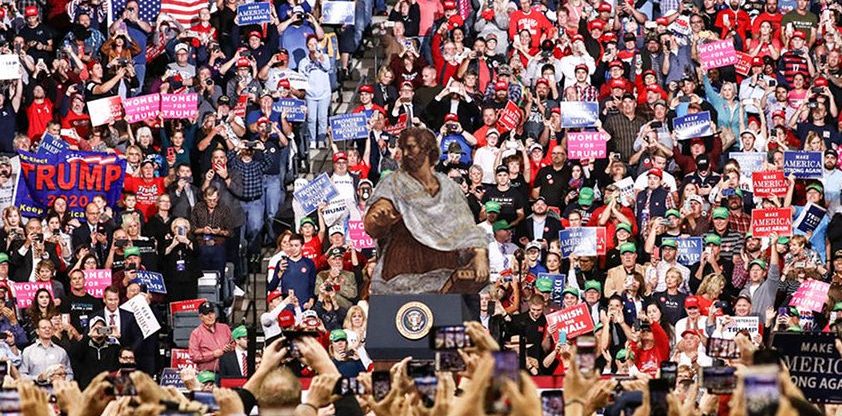Digital tech is laying bare American exceptionalism in a new way.
Americans Want Greatness, Not Just Jobs

Economic nationalism is not enough: cultural and civic revival beats an economic backstop.
Is abandoning “Reaganism” in favor of “economic nationalism” the key to reviving conservatism and our country? Daniel McCarthy makes this argument in his new essay at First Things.
McCarthy makes some good points, and many of his critiques of what many call Conservatism, Inc. are just. He’s certainly correct to claim that the days of the Clinton and Bush mono-party are over and those trying to revive them are living in fanciful 1990s nostalgia. Voters resoundingly rebuked the old order in 2016. We’d be fools not to listen.
McCarthy claims that we face three choices: “mild nationalism, resurgent socialism, or suicide by liberalism.”
What he calls “palliative liberalism” is a response to economic dysfunction. It will not just upend our culture of hard work and individualism, it will destroy it—more so than any New Deal program. Worse still would be the turn to socialism, which is increasingly and unabashedly adopted by the rising hard Left.
What we are left with is “mild nationalism,” as he calls it. But what does that mean?
McCarthy fairly critiques the American “credentialed” elite, yet his ultimate resolution to our country’s troubles misses something critical by putting too much hope in economics to bring about American restoration.
This is not the first economic upheaval America has faced. Our transition from an agricultural to manufacturing society temporarily roiled our economy; but the turbulence led to our mid-twentieth century triumph, with America unquestioned at the pinnacle of the free world.
Yes, there were significant problems under the surface—unresolved racial injustice and an activist government that eroded the Constitution and our civil liberties—but the country remained a shining city upon a hill.
Our economic challenge today is somewhat uneven. Though there are undoubtedly parts of the country that have suffered under modern economic conditions; others have flourished. We’ve seen economic growth in states like California, which has benefitted enormously from trade and the tech boom, and places like Washington D.C., which has benefitted nearly as prodigiously from the government leech boom.
But traditional conservative ideas about governance and economics have also found success in states like Arizona and Texas, where a thriving middle class enjoys stable growth and reasonably restrained government.
As Edward L. Glasser points out in City Journal, the Western heartland is experiencing high growth and low joblessness. In fact, by many measures, this region is doing better than the coastal areas, with lower mortality rates and more shared prosperity. “When Texas succeeds, its economy provides moderate prosperity to many,” Glasser writes. But, “when Silicon Valley succeeds, its economy provides extreme prosperity to a few.”
Prosperity for these Americans was produced by the “Reaganite” policy model, which fostered stability, wealth, and upward mobility.
But the success of Reaganite economics in the Sun Belt does not imply that we should accept the Rust Belt’s continued decline. Detroit was once the crown jewel of the American producer economy. Henry Ford once claimed that he “invented the modern age.” Detroit and the industrial towns dotted across the American landscape were the products of that creation, an industrial heartland that delivered us victory in World War II. Every American should champion its revival, and perhaps McCarthy offers viable ways for that to happen.
Certainly, a bland and colorless “pro-business” conservatism that delivers unconvincing assurances to suffering Americans isn’t the way forward. McCarthy argues that the counter to this is economic nationalism, which has roots in the GOP going “all the way back to Abraham Lincoln. “
Actually, they go back even further.
Reviving an Old Idea
Henry Clay, a Kentucky statesman admired by Lincoln, advocated the use of protectionist tariffs to protect infant American manufacturing and fund national infrastructure projects as a part of what he called the “American System.”
Clay offered an alternative to purely laissez faire doctrine, but his American System was a far cry from the top-down economic and social engineering of the later New Deal and Great Society. Clay’s brand of economic nationalism became a critical platform of the Whig and early Republican Party.
Perhaps, if we can’t recreate the “American system,” we should seek new solutions, such as a contemporary “Homestead Act,” opening up vast swaths of unused federal land for Americans to develop and make themselves into prosperous, middle-class landowners.
But even if we assume nationalist economics will succeed, economic revival is not enough. By all accounts, the economy of the last two years has been booming, but are Americans any less at each others’ throats? The economic debate still ignores the elephant in the room, the cause of our disintegration and the spark of the great open conflict brewing in America and throughout the West.
McCarthy gently criticizes the conservative fixation on the idea that “Politics is downstream from culture:”
As important as that truth is, it is easily misapplied. In practice it has meant that conservatives emphasize certain “cultural” forms of argument without seriously confronting the hard questions of politics or economics—as if worldly matters will take care of themselves if only our rhetoric is elevated and our intentions pure.
“Politics is downstream from culture”—popularized by a man no one could accuse of “political quietism”—is not a mantra that rules out political solutions to cultural problems. It simply acknowledges that as long as people swim in the milieu created by captured cultural institutions—schools, Hollywood, mainstream religion—they are not open to conservative arguments of any kind, economic or social. As long as the opponent holds the cultural bastions, we’ll always be playing on the opponent’s field.
This is the central issue facing conservatism: new solutions may be political, rhetorical, or otherwise, but we need them. In his critique of the old conservative order, McCarthy repeats its greatest mistake. Even if the economic revival comes, and in exactly the way he hopes, will we have truly set America on a sustainable path forward?
Perhaps, but it seems unlikely.
Reaganism’s failure was not its embrace of free market economics, whatever one thinks of globalism today, but that it failed to promote in any meaningful way the informed patriotism Reagan extolled in his farewell address.
The temporary patriotic revival in the 1980s didn’t last. As conservatives gained major footholds in political places of power, we were routed in the places that most shape hearts and minds.
This has caused a deeper spiritual problem, and not just in the sense of declining church attendance. We increasingly don’t know who and what we are, what our place is in the world, and why America was so great to begin with. You cannot maintain nationalism among a people without a sense of nation.
Unlike economic decline, this problem is not regional, but national. And failing to confront it is what will truly and permanently lead to our ruin. “If a nation expects to remain ignorant and free,” wrote Thomas Jefferson, “it expects what never was and never will be.”
Only a quarter of Americans can name the three branches of government after graduating from public schools where Howard Zinn’s A People’s History remains a popular textbook. If they’re studious, they go on to attend a university where almost half of the professors in humanity disciplines are not just left-wing, but self-described radicals, and conservatives are a rounding error. They amuse themselves with films and sporting events awash in “social justice,” and when they tune in to the major news networks, they are delivered increasingly brazen left-wing narratives, regardless of the underlying facts.
The anxiety Americans feel is not entirely, or even primarily, economic. “Make America Great Again” did not resonate just because of dollars and cents, but because millions have the intangible feeling that something more fundamental about America is slipping away.
An American elite obsessed with perpetual virtue signaling to prove their superiority over not only their “deplorable” countrymen, but their unenlightened ancestors, have force-fed the American people both mediocrity and self-loathing.
We are nearly bereft of that old elite, the Theodore Roosevelts of an earlier time, who used their wealth, status, and education to lift up their fellows while attributing their own success to the unique privilege of being American, not their innate superiority.
The institutions that once reinforced national civic virtues are now peddling vices incompatible with a republic’s health. Even if successful, no amount of “economic nationalism” is going to stave off the fall if the leftist takeover of our cultural institutions remains in place.
The American elites’ malfeasance is not that they have grown rich while everyone else becomes poor. That would be a much simpler issue to solve. It is instead that their values—including their new religion of Progressivism—have trickled down to the American people en masse.
Nothing symbolizes this new religion better than a gym in Manhattan located in the innards of a now-defunct old church. A sign in front says “worship me,” the shameless mantra of the bastardized faith of the new elite.
Fighting the Fight That Really Matters
Rich or poor, economically nationalist or laissez-faire, America cannot survive when its cultural institutions actively promote anti-Americanism. It’s hard to have any kind of national revival if we remain aloof or scornful of our common history, or worse, fail to regard it as common. Given the total bastardization of the American story that is now peddled from nearly every institution entrusted with keeping it, it is amazing that there are any dissenters left.
But even at this advanced stage of dysfunction and indoctrination, the American people rejected Hillary Clinton, revile their mostly-dishonest press, and are increasingly skeptical of the value of our universities, which act as a mere hives for the next generation of left-wing activists. Today—as before in our history—a healthy amount of “populism,” can be a key component to national revival in the face of a corrupted elite. But conservatism must be more than anti-left, and we need a positive agenda that focuses on the heart of the problem. This does not mean failing to confront hard questions of politics, as McCarthy suggests, but instead shaping our politics to prioritize the cultural battles that matter most, and coming up with new solutions to hit the left where it is strong.
We have a vibrant alternative media—thanks in part to the decentralization of the internet—but we need to improve on other fronts.
The best way to inoculate students from indoctrination at our universities is to give them a hearty dose of American values and civic education in our homes and in K-12 schools, but conservatives largely ignore education issues. In some Republican-controlled states, leadership has to beg elected representatives to chair education committees; Republican priorities are tax cuts and guns, not shaping the institution in which 90 percent of young American minds spend their formative years.
School choice, one of the few viable ways to break the left’s ideological monopoly over public schools—which now fervently work to un-assimilate Americans rather than Americanize them—has been neglected by the conservative movement. Years of overwhelming Republican dominance in state legislatures has not led to great advancements in educational freedom.
Similarly, conservatives should be asking themselves hard questions about how much taxpayers should be subsidizing increasingly left-wing institutions of higher education. The trillion and a half dollars of federally-backed student loans amount to a massive subsidy to universities, allowing them to raise their tuition prices well above inflation rates and spend millions on “diversity” departments. In his speech at CPAC, President Trump hinted that he would make that money contingent on free speech protections. Freezing the ever-skyward march of loan subsidies–a regressive government program that bills those without college credentials for the loans of the elite–could also get universities’ attention.
McCarthy worries that cultural solutions absolve conservatives of having to muster political will, but Americans have had a smaller and smaller space in which to conduct politics over the last century. Reforming the administrative state, for example by abolishing the “professional,” permanent civil service, would return command over government decisions to the voters, and give Americans’ atrophied muscle of self-government some much-needed exercise.
Finally, we should take to heart the lessons from the success of President Trump’s 2016 slogan; we need to fearlessly defend American greatness.
We can call it nationalism, old-fashioned patriotism, or simply “Americanism”, but what’s important is its revival.
Our past need not be perfect for it to be worth celebrating. It can still serve as the basis for the e pluribus unum we so desperately lack. Gratitude—and even more importantly, honor—for the sacrifices and triumph of Americans who came before us were on full display during Trump’s State of the Union as he celebrated Buzz Aldrin and World War II’s heroes. The 2019 State of the Union showcased, through contrast, the bitter resentfulness that characterizes the modern left, perfectly represented by the Mean Girl Caucus, who only cheered for themselves.
It is only by reviving the confidence and pride Americans once felt in being American and the sense that we can still move forward as a united nation that we can we begin, as McCarthy concluded, to govern “in the century in which we actually live rather than the one shaped by our political heroes.”
Shifting America’s trade policies and relying more on skills-based immigration may produce some positive results, or even shore up a Republican coalition that includes an electoral “red wall” in the Rust Belt, but it won’t divert the American cultural current from its path dictated by modern pop culture, media, and our schools. The left first waged war on, then conquered our nation’s cultural institutions. It’s time that we accept the reality that we are yelling into a cultural headwind, and make it our explicit goal to either win those institutions back or create new ones. The fate of our republic, the Constitution, and the American people–as well as “nationalism”–depends on it.
The American Mind presents a range of perspectives. Views are writers’ own and do not necessarily represent those of The Claremont Institute.
The American Mind is a publication of the Claremont Institute, a non-profit 501(c)(3) organization, dedicated to restoring the principles of the American Founding to their rightful, preeminent authority in our national life. Interested in supporting our work? Gifts to the Claremont Institute are tax-deductible.
Elites and Middle America need each other, and both have a duty to work together to serve our national interest and the common good.
Subsidizing small-town 20th century jobs is not the answer. Nationalists should be careful not to lower their expectations—and ours.
Retrieving an honorable, successful philosophy.




